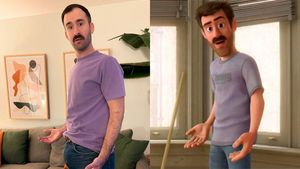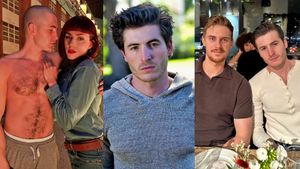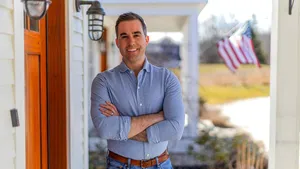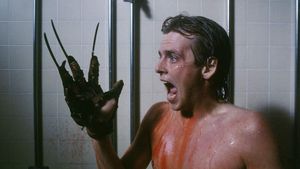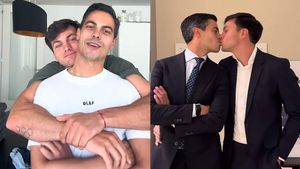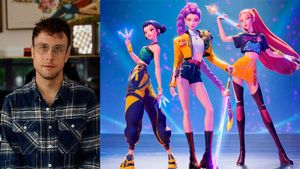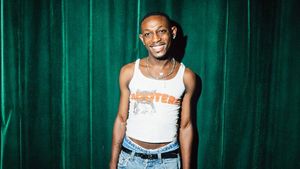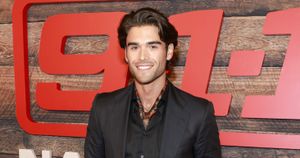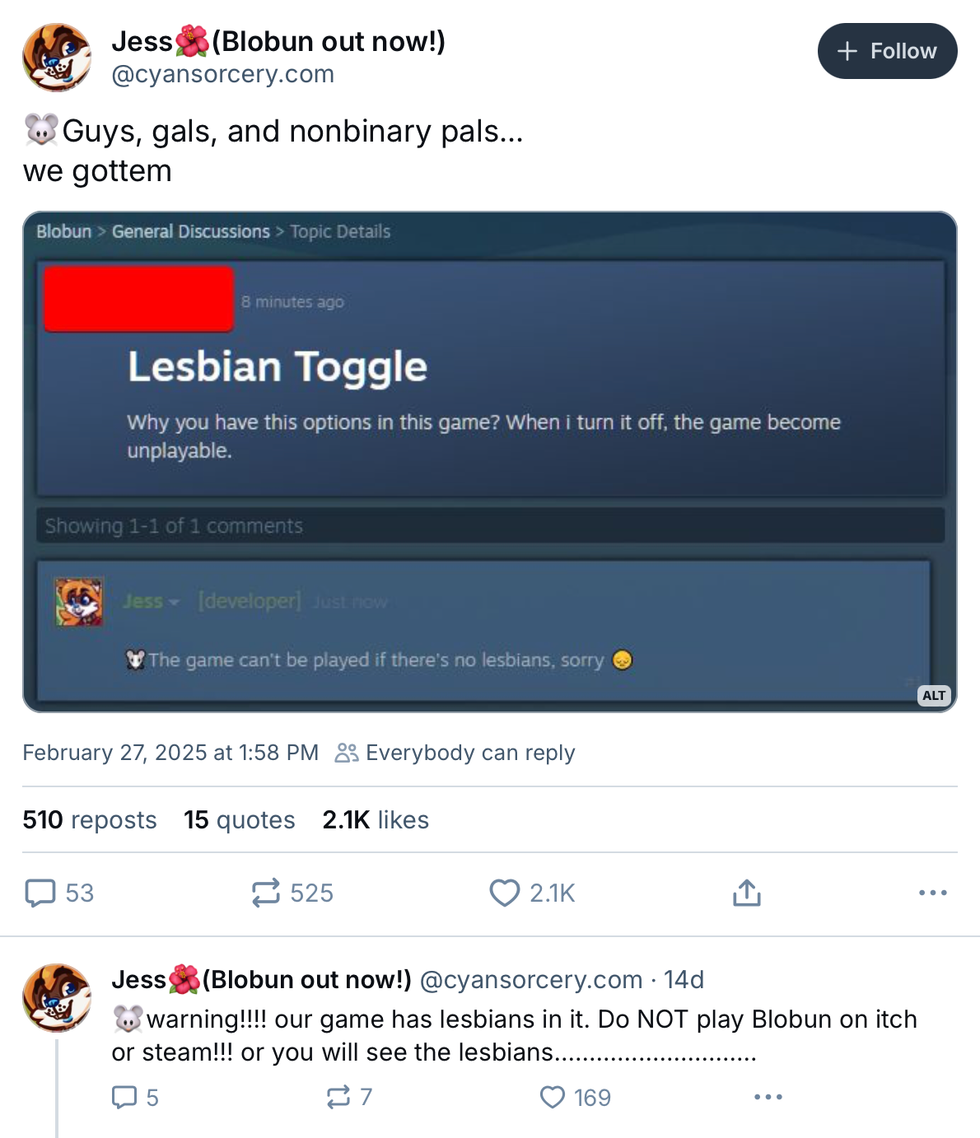comiXology's newest original title may be set in 1930s Germany, but its themes and lessons are still incredibly relevant.

Liebestrasse, comiXology's newest addition to its slate of original titles, tells the story of Sam and Philip, two queer men in '30s Germany living and loving during a time where fascism and hate are on the rise. Considering that LGBTQ+ stories from WWII era still hardly get told, Liebestrasse feels like an extremely needed graphic novel that has a lot of lessons that are still relevant and timely today.
"During the final years of the Weimar Republic, Sam meets Philip in Berlin and they fall in love," reads Liebestrasse's description on comiXology. "Their romance is hit with an unspeakable reality as the Nazis come to power and fascism makes them a target."
PRIDE got to chat with Liebestrasse writer Greg Lockard and artist Tim Fish about the importance of creating the historical, queer graphic novel, and we've even got an exclusive preview of the cover and an inside look at the pages of the novel itself!
Scroll down to read our interview with the team and see exclusive images from Liebestrasse, which goes on sale on comiXology on November 6!
PRIDE: What was the inspiration behind Liebestrasse, and what made y'all want to tell Philip and Sam's story?

Greg Lockard: I’ve been told countless times in my career that "period pieces don’t sell" so it was particularly thrilling to be given a greenlight to develop this story into a graphic novel. I love visiting different time periods and different worlds in the fiction I read/watch/view/hear. Escapism can also challenge your knowledge base and your world-view, if you are open to expanding yourself! The need to tell Philip and Sam’s story grew out of the erasure of LGBTQ+ people now as well as in the fiction and art of the 1930s and beyond.
Tim Fish: As a propaganda camp—to trick the world into believing prisoners were treated well—the Nazis at Theresienstadt kept detailed records of the prisoners. When I toured the camp, the museum contained many photographs and stories of the prisoners. It was easy for me to pick out some of the gay inhabitants who lived there. But a week later, I visited Auschwitz, which was overwhelming—the sheer magnitude death. Yet the experience, for me, was about that magnitude. It wasn’t until I was back in Krakow, sitting on a park bench, when the stories of the real people in Theresienstadt became connected to the anonymous ones in Auschwitz.
I couldn’t help thinking about the gay men and lesbians, living in a relatively liberal place and time, their lives abruptly changed. I began sketching Sam and Philip in my sketchbook and imagining their lives. Ultimately, I wanted people to be reminded that despite our steps forward in acceptance, there’s always a threat of steps back.
PRIDE: Despite it being a period piece, there are a lot of relevant political and social messages that still matter in this day and age. Why was that important to you?

Greg Lockard: The parallels between the end of the Weimar Era and today’s global political landscape are too terrifying to ignore and we want readers to see those parallels, too. Our characters didn’t act in time. The entire world in the 1930s did not act in time.
Hopefully, not only LGBTQ+ people recognize this but also recognize the threat to other minority groups. We started working on this story before the 2016 election in the United States but as we worked the global rise of right-wing voices and neo-Nazi rhetoric was far too loud to ignore. You can’t turn on your computer or your television without seeing the amplified voices of racist/Anti-Semetic/transphobic/misogynistic/homophobic persons. We are here to stand against these threats, we are here to say “this will not be tolerated.”
Tim Fish: I toured the camps in 2008 and let the idea sit for a long time. But the 2016 election brought the idea to the forefront, fast. After the right to marry was won, who thought we’d have a right to employment for LGBT people in front of the Supreme Court?
PRIDE: What kind of research went into creating a queer, historical piece like 'Liebestrasse? '

Greg Lockard: A lot of research into a few different eras, including scholarly texts and non-fiction memoirs (Gay Berlin by Robert Beachy; I, Pierre Seel, Deported Homosexual: A Memoir of Nazi Terror by Pierre Seel; The Pink Triangle: The Nazi War Against Homosexuals by Richard Plant; An Underground Life: Memoirs of a Gay Jew in Nazi Berlin by Gad Beck; Christopher and his Kind by Christopher Isherwood) and fictional representations (Christopher Isherwood’s Berlin Stories, Jason Lutes’ Berlin, Philip Kerr’s Berlin Noir triology amongst others) and in film (Casablanca; Berlin Alexanderplatz; Babylon Berlin; Bent; Another Country).
Tim Fish: When Greg agreed to write the short story version, he set off to do lots of research, including photo references. As for me, I looked at a lot of 1930s clothing patterns and images.
PRIDE: What did you learn from creating the graphic novel that you didn't know before?

Greg Lockard: A significant amount of European and German history that lead into World War I...I never learned or understood due to an intense dislike of the subject in high school and earlier.
Tim Fish: Between my studies in history, and time at the camp museums, I knew the sad details.
PRIDE: What lessons and messages about love and identity do you hope readers get after they finish reading 'Liebestrasse?'

Greg Lockard: I hope LGBTQ+ people see themselves. I hope our allies see us. I spent a lot of time as a gay/queer young person not seeing myself in media. My world opened up greatly once the connection was made. I hope we make more connections and we can build a community. In Gay Berlin, Beachy quotes Magnus Hirshfeld all the way back in 1930 (and I am paraphrasing poorly), noted that one of them most important parts of his research was creating a community at the Institute of Sexual Research was the social aspect that helped all LGBTQ+ people that lived in Berlin (and beyond through the LGBTQ+ media that flourished in Berlin and was sent worldwide). One hundred years later that is still what we need—to find each other, around the world and all over the internet, and to learn from each other and respect each other and to help those that need help. Our differences are what make us impossible to defeat. Our differences are the future.
Tim Fish: Sadly, human beings have a horrible capacity to label and hurt one another. I hope it might help remind readers to think about each other as actual people, with actual feelings. A little compassion can go a long way.





